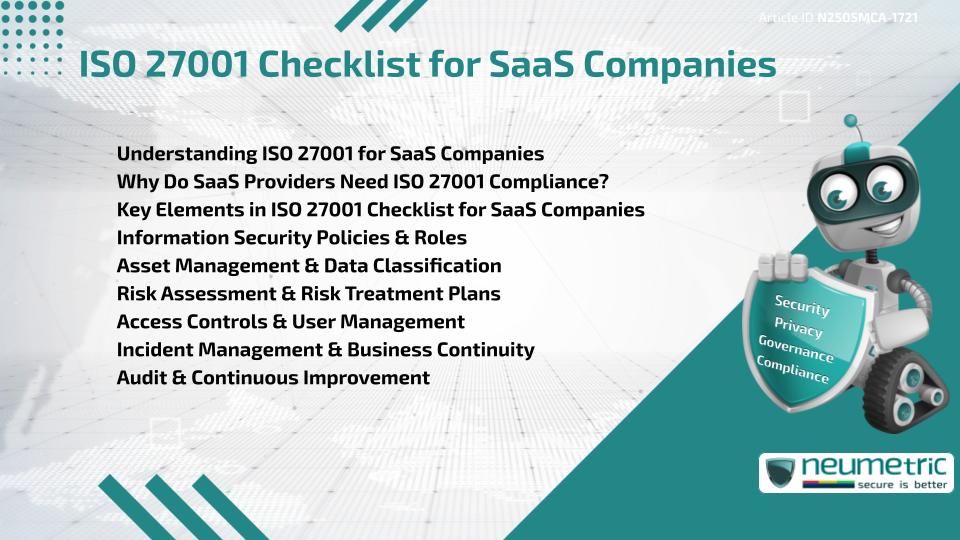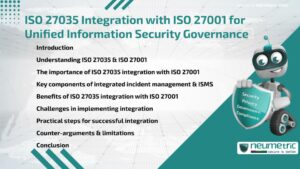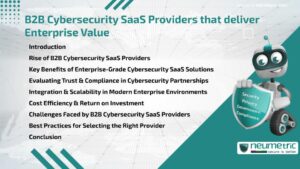Table of Contents
ToggleIntroduction
In today’s environment, SaaS Providers must treat security as a core business priority. Customers expect their data to be safe, regulators demand Compliance & investors prioritise operational resilience. Among the most trusted global frameworks, International Organisation for Standardisation 27001 [ISO 27001] stands out as a gold Standard for managing Information Security.
For growing cloud-first businesses, following an ISO 27001 checklist for SaaS companies ensures a structured & repeatable approach to Data Protection. This article breaks down key checklist items & simplifies the path to ISO 27001 Certification.
Understanding ISO 27001 for SaaS Companies
ISO 27001 is a globally recognised Framework for establishing Information Security Management System [ISMS]. This Framework is centered around continuous Risk evaluation & enhancement. It doesn’t mandate any particular tools or providers. Instead, it focuses on Governance, documentation & controls.
For SaaS Providers handling Customer Data, ISO 27001 offers a clear & auditable path to proving security maturity. The ISO 27001 checklist for SaaS companies maps these requirements into practical, trackable steps.
Why Do SaaS Providers Need ISO 27001 Compliance?
SaaS companies operate in dynamic, multi-tenant environments with shared infrastructure & fast deployment cycles. This creates both opportunity & Risk.
Complying with ISO 27001:
- Demonstrates a commitment to protecting data
- Builds credibility in competitive markets
- Supports Compliance with other regulations such as GDPR & HIPAA
- Reduces the likelihood & impact of breaches
Without a formal Security Framework, even minor oversights can lead to Customer churn or legal exposure. The ISO 27001 checklist brings structure to teams & systems, helping prevent Security Gaps.
Key Elements in ISO 27001 Checklist for SaaS Companies
A good checklist bridges policy with execution. Let us explore each major element in a SaaS context.
Information Security Policies & Roles
Every ISO 27001 journey begins with Governance. SaaS companies must document security objectives, assign responsibilities & define a clear Security Policy.
This includes:
- Appointing an ISMS manager or team
- Establishing acceptable use, encryption & backup Policies
- Communicating responsibilities to all Employees
Asset Management & Data Classification
Identify & categorise all assets—cloud platforms, databases, code repositories & vendor services. Classify data based on confidentiality, integrity & availability.
Checklist items here include:
- Maintaining an asset inventory
- Defining data classification levels
- Applying protective controls accordingly
Risk Assessment & Risk Treatment Plans
Risk Management is central to ISO 27001. Companies must identify what could go wrong, evaluate potential impact & decide how to reduce or accept each Risk.
The ISO 27001 checklist for SaaS companies should include:
- A documented methodology for Risk Assessment
- Identification of Threats & Vulnerabilities
- Treatment strategy guided by ISO 27001 Annex A controls.
Access Controls & User Management
Control who can access what—and how. In a SaaS model, internal staff, customers & contractors may all use the system. Controls must reflect this complexity.
Checklist recommendations include:
- Role-based Access Control [RBAC]
- Strong password Policies
- Timely User provisioning & deactivation
Understand Access Control in ISO 27001
Incident Management & Business Continuity
SaaS Providers must be prepared for disruptions—whether from cyberattacks, human error or system failure. The Standard emphasises quick action & strong recovery measures.
Include in the checklist:
- A defined Incident Response procedure
- Communication plans for internal & external Stakeholders
- A tested Business Continuity & Disaster Recovery plan
Audit & Continuous Improvement
Certification is not a one-time effort. ISO 27001 emphasises continuous review & improvement.
Key checklist items:
- Internal Audit schedules
- Regular management reviews
- Metrics to evaluate ISMS performance
A mature ISO 27001 checklist for SaaS companies should evolve with technology, Customer expectations & business needs.
Conclusion
Following a well-structured ISO 27001 checklist for SaaS companies helps teams meet Compliance goals while building a culture of security. From Risk Assessments to Incident Response, each checklist item contributes to operational reliability & trust. Whether your company is preparing for certification or simply strengthening its internal controls, this Framework brings both clarity & credibility.
Takeaways
- ISO 27001 helps SaaS companies manage Information Security through Governance, Risk Management & continual improvement.
- A tailored checklist simplifies implementation across diverse cloud & team environments.
- Key focus areas include policy setting, asset classification, Access Control & Incident Response.
- Certification requires documented proof of each control & evidence of ongoing review.
- A checklist ensures nothing is missed during internal reviews or Third Party audits.
FAQ
What are the ISO 27001 checklist for SaaS companies?
It is a structured list of controls & actions that help SaaS Providers implement ISO 27001 standards for Information Security management.
Why do SaaS companies need ISO 27001?
ISO 27001 enhances trust, ensures Regulatory Compliance & helps secure Customer Data in cloud environments typical of SaaS platforms.
What is the typical time taken to implement ISO 27001?
For most SaaS companies, implementation can take between three (3) to twelve (12) months depending on company size, maturity & resources.
Who is responsible for managing ISO 27001 Compliance in a SaaS company?
Responsibility is typically shared across security, IT & Compliance teams, with a dedicated ISMS owner overseeing the Framework.
Is ISO 27001 mandatory for SaaS Providers?
It is not legally required but often expected by enterprise clients, especially those in regulated industries like Healthcare & Finance.
What key documents are on the ISO 27001 checklist?
Policies, Risk Assessments, treatment plans, Incident Response procedures & Internal Audit records are among the most critical.
Can ISO 27001 be combined with SOC 2?
Yes, many controls overlap. Integrating both frameworks helps SaaS Providers streamline Compliance & reduce duplicate efforts.
Does the checklist apply to startups too?
Yes, startups benefit by building security practices early, reducing rework later when scaling or engaging larger clients.
Need help?
Neumetric provides organisations the necessary help to achieve their Cybersecurity, Compliance, Governance, Privacy, Certifications & Pentesting goals.
Organisations & Businesses, specifically those which provide SaaS & AI Solutions, usually need a Cybersecurity Partner for meeting & maintaining the ongoing Security & Privacy needs & requirements of their Clients & Customers.
SOC 2, ISO 27001, ISO 42001, NIST, HIPAA, HECVAT, EU GDPR are some of the Frameworks that are served by Fusion – a centralised, automated, AI-enabled SaaS Solution created & managed by Neumetric.
Reach out to us!





